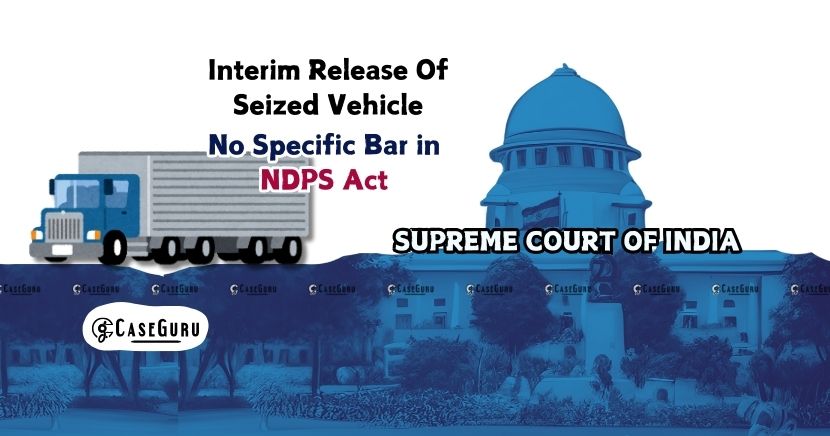
No Specific Bar in NDPS Act, Supreme Court Allows Interim and Conditional Release of Vehicle in NDPS Case
The Supreme Court allowed the release of a seized vehicle to its owner during an NDPS trial, highlighting the absence of a specific bar in the NDPS Act and the applicability of general provisions of CrPC.
In the NDPS case where there was a seizure of heroin from a truck lead to the current appeal questioning whether the truck's owner should get his vehicle back while the legal proceedings are ongoing. The appellant, Bishwajit Dey, owned a truck that he used for commercial purposes, which was his only source of income. On April 10, 2023, the truck was stopped at a checkpoint where police found 24.8 grams of heroin hidden inside the accused and the main accused, Md. Dimpul, who was a passenger in the truck, was arrested.
The truck was seized, and the owner, Bishwajit Dey, was not charged in the initial report., however, his truck was seized. Bishwajit Dey claimed that he and his driver were unaware of the drugs and that Md. Dimpul was carrying the heroin without their knowledge. Bishwajit Dey filed a petition seeking the release of the truck, stating it was deteriorating while being held at the police station.
The core issue was whether the truck should be released to its owner, Bishwajit Dey, while the drug trafficking case was still being tried. The Supreme Court considered arguments from both sides. The court decided that, in this case, the truck should be released to its owner under certain conditions. Here’s a breakdown of the court’s key points:
No Specific Bar in NDPS Act:
The court noted there is no specific restriction in the Narcotic Drugs and Psychotropic Substances (NDPS) Act that prevents the release of a seized vehicle during a trial.
Application of CrPC: The court clarified that, in the absence of a specific bar in the NDPS Act, the general powers under Sections 451 and 457 of the Code of Criminal Procedure (CrPC) can be used for the return of the seized vehicle.
Confiscation of Vehicle: The court stated that the seized vehicle can be confiscated by the trial court only after the conclusion of the trial, if the owner cannot prove the vehicle was used without their knowledge or consent. The owner must be given a hearing before confiscation.
Interim Release: The court held that the trial court has the discretion to release the vehicle in the interim, and such power would have to be used judiciously based on the facts of each case.
Absurd Interpretations: The court noted that the interpretation of the law should not lead to absurd results, such as seizing a private plane or bus if drugs are found without the knowledge of the owners.
Scenarios for Seizure:
The court broadly identified four scenarios for drug seizures from vehicles:
1. When the owner is carrying the drugs.
**2. When the owner’s agent (like a driver) is carrying the drugs.
**3. When the vehicle is stolen and used to carry drugs.
**4. When a third-party occupant is carrying the drugs, without the owner's knowledge.
The court noted that only in the first two scenarios, the vehicle may not be released on interim basis.
Release in this Case: The court emphasized that the owner of the truck in this case was not named as an accused in the chargesheet, and therefore, his vehicle should be released on "superdari" (interim custody).
Conditions for Release: The court directed that the vehicle be released on "superdari" after taking a video and still photos, with proper documentation for identification, and with the condition that the owner should not sell the vehicle and should produce the vehicle as and when required by the court.
Deterioration of Seized Vehicles: The court took note of the fact that vehicles in police custody are usually kept in the open and thus, are subject to deterioration. This prompted the court to order the interim release of the vehicle. Important Observations by the Supreme Court
The court highlighted that no specific provision in the NDPS Act that prohibits the interim release of seized vehicles.
The Apex Court also affirmed the applicability of the general provisions of the CrPC in the absence of any specific restriction under the NDPS Act and emphasized that any interpretation of a law should not lead to illogical outcomes.
The Court also further held that the criminal law has to be applied to the specific facts of the case, and it cannot be applied in vacuum, and in this case, the owner's vehicle should be released since the owner was not named as an accused.
Noting the deteriorating condition of vehicles kept in police custody, the court ordered the release of the vehicle would be beneficial to the owner for his livelihood.
The court referred to a similar case, Sainaba vs. State of Kerala and Another , where the Supreme Court had allowed the release of a vehicle in similar circumstances.
The Supreme Court allowed the appeal and directed the trial court to release the vehicle to the owner, Bishwajit Dey, on "superdari" with certain conditions.
Coram: Justice B.R. Gavai , Justice K.V. Viswanathan and Justice Sandeep Mehta
Between: Bishwajit Dey vsThe State Of Assam
Date of Judgment: 07-01-2025



Comments